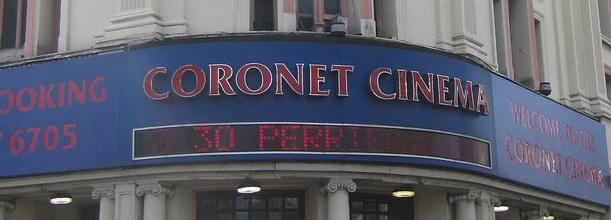Save our Independent Cinemas! This week: the Coronet Cinema

Location: 103 Notting Hill Gate, London W11
Screens: 2
Capacity: 388 (Screen 1) / 151 (Screen 2)
Tickets: £7 / £3.50 (student)
Visit the Coronet here!
When I was a dizzyingly skint student living in West London, I took one look at the prices of my local Odeon and despaired. Having resigned myself to a year of watching films through other people’s windows or courtesy of the gentleman who haunted local cafes with a carrier bag full of enticingly illegal DVDs, it is almost impossible to convey just how thrilled I was when the Coronet Cinema first entered my consciousness. Enfolded in its slightly dusty and creaking embrace, I relaxed in the certain knowledge that I had been spared a year of inferior cinematography. It was quite a relief.

Perhaps alone of all London’s independent cinemas, you would probably recognise the Coronet even if you’ve never visited it – it played a brief role in Notting Hill as the backdrop for Hugh Grant’s prescription-goggled mooning about, although you may have been too busy wondering who on earth thought Julia Roberts would look good in a space suit and a ginger wig. And if this is the extent of your acquaintance with the Coronet, it’s high time you let your relationship progress to the next level! No, not groping. Go and visit it, it’s wonderful.
The theatrical ugly duckling which was born to show films
Walk up Notting Hill Gate and you can’t miss the Coronet – it’s the one with the massive inexplicable dome on top, supported by a frantic if ill-advised attempt by someone or other to see just how many pillars they could cram onto one building. These are your first clues to the Coronet’s back story, since unlike your soulless local multiplex it boasts a long and illustrious history. Originally a Victorian theatre, the Coronet found itself suffering as a result of its awkward location just beyond the edge of the West End – imagine it’s that patch of skin between your shoulder and the nape of your neck, just out of standard moisturiser reach but not enough of an event to justify its own beauty routine. A little too far from the lights of Theatreland to scoop up any glamour by association, the Coronet was nevertheless close enough to the West End to lose spectators to its superior lure, and it struggled as a result. Happily, after twenty-five years its owners decided to give up live theatre and the Coronet became a full-time cinema in 1923, which is quite possibly the last time any work beyond light dusting and popcorn emancipation was done onsite.
There’s no getting round it; the Coronet boasts an eclectic and slightly scruffy mismatch of influences which takes a little getting used to. The main screen, wedged in the proscenium arch of the theatre proper, is covered by an incredible flounced curtain and flanked by huge columns smothered with plaster moulding which absolutely exceeds superlatives. Conversely, the second screen (built on the stage, of all places) is much less memorable, with the defining experience for those over around 5’11 likely to be the hatred its architect apparently harboured for long-legged punters. Happily, the Victorians evidently held no such prejudice, and main screen seats are either placed about quarter of a mile apart or provided with convenient balconies for mid-film foot-dangling. The bathrooms look like they’ve been transplanted from one of those Indian restaurants with the flocking and gold-ish cutlery, and all but one of the ways out of the building are decommissioned fire exits. It’s all a bit chaotic and messy. But then so are Slade, and everyone agrees they represent the pinnacle of Western musical endeavour. Don’t they?
Watching. And drinking. Watching and drinking.
The Coronet’s range is slightly hampered by its small size, so it tends to stick to the cinematic mainstream – in essence, it shows any film big enough to be advertised on the side of a bus. Indie and arthouse fans are more or less left begging, but almost next door is the Gate Picturehouse with its wide range of low-budget and foreign language releases. The Coronet shows three to five films a week, with about six showings a day and a complete turnaround every fortnight – you’re well advised to aim for Screen 1 showings on busy days, since its cavernous space is pretty much impossible to fill so you can usually bag yourself a few seats and spread out your picnic. Yep, picnic. Because – aren’t you excited about how this sentence is going to end? – the Coronet is possessed of the magic combination of being a) devoid of the tiresome ushers that you see so often these days and b) opposite a supermarket. This means that curtain up is normally accompanied by the discreet clanking of four hundred bottles of beer being opened, unless you’re as committed to your alcoholism as I am and take wine glasses wrapped in tea towels so you can enjoy something a little more refined. If by ‘refined’ you mean £2.99 red from a classic hotbed of quality viticulture like North Korea, which I do.
Even if you’re not quite organised enough to manage a Tesco run pre-cinema, you’ll find yourself well-provided for. Given its relative tininess, the Coronet’s front-of-house bar is absolutely superb – there’s a full fridge of bottled beers as well as several on draught, various inoffensive wines by the glass, popcorn machines (ugh) and more Minstrels than you could shake a massively racist 1960s light entertainment show at. Nothing’s overpriced, and since the flat rate for tickets is only £7 there’s not much to object to. Tuesdays are half price, so you’re advised to buy your ticket substantially in advance and then turn up pre-adverts if you want a block of seats, and if you’re lucky enough to be embroiled in higher education then Monday is student night! Simply turn up with something which looks vaguely like a student ID, and you’ll scoop yet another half price ticket PLUS the opportunity to buy any one item from the bar for the princely sum of £1.50! Vat of popcorn, pint of Guinness, you name it. That’s two hours of gently lubricated entertainment for a fiver, and I defy the fleshpots of Soho to match it.
Contentedly dated and more lovable for it, a bit like your gran
Yes, the Coronet is a little bit odd. Yes, it’s a big bit dated. However, it’s also historic, spacious and brimming with character, and you can sink into its threadbare but still relatively plush seats for a fraction of the price of a homogenised and sanitised cinema experience in Leicester Square. Eccentric it is, but so are we all, and it’s as shabbily lovable as a leprous puppy – the Coronet embodies the archetypal independent cinema experience, and after more than a century of entertaining the discerning Londoner it deserves our support more than ever.





Recent Comments